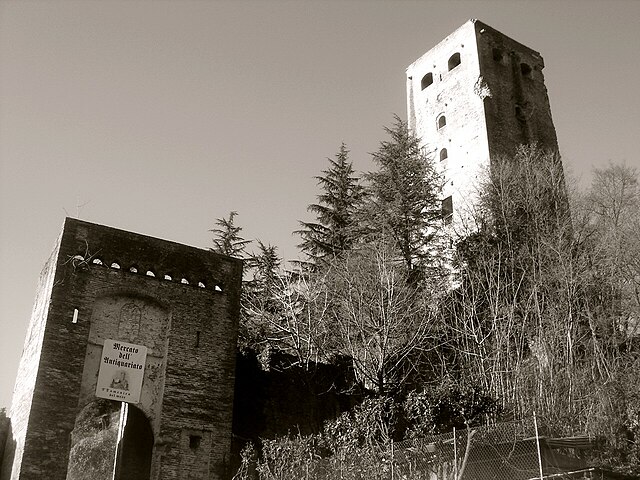Loading AI tools
Austro-Italian noble house From Wikipedia, the free encyclopedia
The House of Collalto (full name - Princes of Collalto and San Salvatore) is an old and distinguished Austro-Italian noble house of Lombard origin, named after their seat at Collalto in Susegana, now in the Province of Treviso in Italy. Throughout its history, the house had their possessions in Italy, Austria and Moravia. Its name comes from Italian (colle alto - high hill).[1]
You can help expand this article with text translated from the corresponding article in German. (November 2016) Click [show] for important translation instructions.
|


There is no definite evidence on the house's origins, but tradition holds that they were initially Lombards. The first documents about the house come from 958. In 1110 the castle Collalto in the hills near the Piave river was built. Later in the 13th century, Rambaldo VIII. had the castle San Salvatore built. The founder of the Austrian family branch was Marco Carlo Collalto, an ambassador of the Holy Roman Emperor Charles IV: at the court of Innocent IV. The family was raised to the rank of Imperial Count in 1610 by Emperor Ferdinand II, who sold the Moravian possessions with the centre in Brtnice (Pirnitz) to Rambaldo XIII. On 22 November 1822 they were raised to the rank of Prince in Austria. The family belonged to the list of 16 Princely Houses that were not mediatized.
The Italian possessions consisted of the castles Collalto and San Salvatore. The Moravian possessions gained by Rambald XIII were in the extent of 10,827 ha.[2] The house owned them till 1945, when they were confiscated by Czechoslovakian state.
Nowadays, Prince Collalto is a wine producer in Sussegana near Treviso and the acting head of the family is Princess Isabella of Croÿ, firstborn child of Prince Manfredo von Collalto und San Salvatore (b. 1932) and his wife, Maria de la Trinidad Castillo y Moreno (b. 1937), daughter of Joaquin Castillo y Caballero, Marquis de Castro de Torres. [3]
Seamless Wikipedia browsing. On steroids.
Every time you click a link to Wikipedia, Wiktionary or Wikiquote in your browser's search results, it will show the modern Wikiwand interface.
Wikiwand extension is a five stars, simple, with minimum permission required to keep your browsing private, safe and transparent.